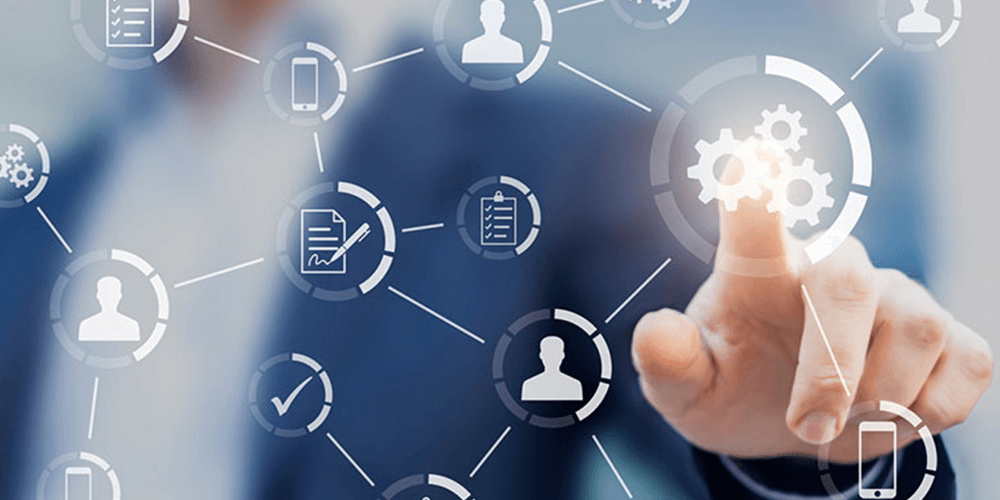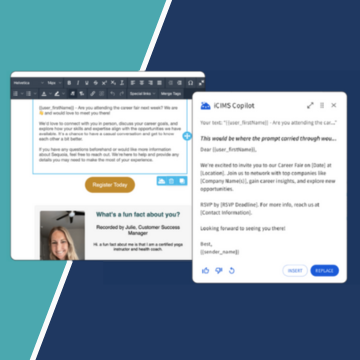- Solutions
- Products
- Community
- Resources
- Company
Create incredible candidate experiences that communicate your brand, mission, and values with recruitment marketing solutions.
Learn moreCommunicate effectively and efficiently with the candidates that can drive your business forward.
Learn moreSelect the right candidates to drive your business forward and simplify how you build winning, diverse teams.
Learn moreHelp your best internal talent connect to better opportunities and see new potential across your entire organization.
Learn moreCommunicate collectively with large groups of candidates and effectively tackle surges in hiring capacity.
Learn moreAccess tools that help your team create a more inclusive culture and propel your DEI program forward.
Learn moreRebound and respond to the new normal of retail with hiring systems that are agile enough to help you forge ahead.
Learn moreAccelerate the hiring of key talent to deliver point of care and support services that meet and exceed your promise of patient satisfaction.
Learn moreAttract and engage candidates with technical competencies, accelerate hiring for much-needed skills, and advance expertise within your valued workforce.
Learn moreSimplify how you recruit finance, insurance, and banking candidates with a unified platform built to match top talent with hard-to-fill roles.
Learn moreYour business strategy depends on your people strategy. Keep both in lockstep with the iCIMS Talent Cloud.
Learn moreBuild an engaging, high-converting talent pipeline that moves your business forward.
Learn moreDeliver the innovation your talent team needs, along with the global scale and security you demand.
Learn moreDeliver tailored technology experiences that delight users and power your talent transformation with the iCIMS Talent Cloud.
Learn moreThe #1 ATS in market share, our cloud-based recruiting software is built for both commercial and large, global employers.
Learn more Talk to salesAttract the best talent for your business with powerful, on-brand career websites that excite candidates and drive engagement.
Learn more Talk to salesCombine behavior-based marketing automation with AI insights to build talent pipelines, engage candidates with multi-channel marketing campaigns, and automatically surface the right talent for the job.
Learn more Talk to salesEmpower candidates with automated self-service, qualification screening, and interview scheduling through an AI-enabled digital assistant.
Learn more Talk to salesSimplify employee onboarding with automated processes that maximize engagement and accelerate productivity.
Learn more Talk to salesVerify skills with game-changing levels of automation and simplicity to improve the quality of hire at scale.
Learn more Talk to salesModernize, streamline, and accelerate your communication with candidates and employees.
Learn more Talk to salesTransform the talent experience by showcasing your authentic employer brand through employee-generated video testimonials.
Learn more Talk to salesSimplify recruiting, dynamically engage talent, and reduce hiring bias with job matching and recruiting chatbot technology.
Learn moreStreamline and centralize your HR tech stack with configurable, flexible, secure and reliable integrations.
Learn moreHow a beloved restaurant hires 40,000+ annually with a great candidate experience.
Learn moreThousands strong, our global community of talent professionals includes creatives, innovators, visionaries, and experts.
Learn moreTogether we’re creating the world’s largest ecosystem of integrated recruiting technologies.
Learn morePartner with our global professional services team to develop a winning strategy, build your team and manage change.
Learn moreExplore our network of more than 300 certified, trusted third-party service and advisory partners.
Learn moreUncover unique market insights, explore best practices and gain access to talent experts across out library of content.
Get resourcesExpert guidance about recruitment solutions, changes in the industry, and the future of talent.
Learn moreStay up to date with the latest terminology and verbiage in the HR software ecosystem.
Learn moreEmployers everywhere improve hiring efficiently and save money using iCIMS. Estimate the potential business value you can achieve.
Learn moreDive into the Class of 2023 Report highlighting this cohort’s expectations and where employers are willing — and able — to meet them.
Watch nowPartner with iCIMS to build the right strategies, processes, and experience to build a winning workforce.
Learn moreExpert guidance about recruitment solutions, changes in the industry, and the future of talent.
Learn moreDeliver the innovation your talent team needs, along with the global scale and security you demand.
Learn moreView press releases, media coverage, and the latest hiring data. See what analysts are saying about iCIMS.
Learn moreiCIMS is the Talent Cloud company that empowers organizations to attract, engage, hire, and advance the talent that builds a winning workforce.
Learn moreGet to know the award-winning leadership team shaping the future of the recruiting software industry.
Learn moreWe believe the future of work isn't something that "happens" to you. It's something you create. We actively create the future of work with our customers every day.
Learn moreiCIMS is committed to being a responsible and ethical corporate citizen, which is why Environmental, Social and Governance (ESG) initiatives are strategic imperatives.
Learn moreStreamline your tech stack and take advantage of a better user experience and stronger data governance with ADP and the iCIMS Talent Cloud.
Learn moreThe combined power of iCIMS and Infor helps organizations strategically align their business and talent objectives.
Learn moreOur award-winning partnership with Microsoft is grounded in a shared desire to transform the workplace and the hiring team experience.
Learn moreOur partnership with Ultimate Kronos Group (UKG) supports the entire talent lifecycle by bringing frictionless recruiting solutions to UKG Pro Onboarding.
Learn moreLet’s get in touch. Reach out to learn more about iCIMS products and services.
Learn more

Key Points:
In three years, 47% of the services that organizations receive will be delivered via a mix of AI-enabled and non-AI-enabled automation, according to IDC FutureScape 2020.
Despite the inevitable future, artificial intelligence (AI) and machine learning (ML) are both desired and feared in today’s fast-paced hiring landscape.
Colin Day, our founder and chairman, recapped the sentiment expressed at our annual analyst event, iNFLUENCE. Colin heard firsthand from customers and industry pundits the love/hate relationship that talent acquisition has with AI and ML.
Employers are intrigued by the idea of bringing in smart technology to aid in making faster hiring decisions. There isn’t a recruiting team out there that would pass up the opportunity to propel their day-to-day operations as they try to do more with less. However, they also fear the repercussions of relinquishing control and giving AI and ML a bigger stake in the recruiting process.
The uncomfortable stories of AI capabilities cause us to pause when considering how to best build a strategy around the technology. However, properly implementing smart technology that allows us to make better decisions shouldn’t be feared by organizations.
At the core of a successful AI recruiting software use case is a stronger human + technology partnership.


iCIMS ARI communicates, screens, and schedules interviews with candidates.
Human-led AI is the application of technology to empower users, not replace them. Human-led AI gives recruiters full autonomy, using automation and predictive insights as tools for recruiters to make stronger decisions and drive better outcomes. When your talent acquisition software and talent teams work together, technology provides the guard rails, and recruiters receive the highest level of transparency and control to make hiring decisions.
Industry analysts, customers, partners, and internal tech teams agree that the best use case of smart technologies is to bring forward deeper decision-making rather than replace human jobs.
AI and ML provide insights by recognizing patterns and processing large amounts of data, then logically applying actions to that data without ever being explicitly programmed to do so. AI, ML, and automation should exist together within your talent acquisition platform.
Here are some examples of how we use it:
The truth is, an AI model is only as effective as its ability to support the humans using it. That’s right—you’re still the brains of the operation who makes the final call as only a human can. AI-driven recruiting software should offer you new insights that are simple and easy to understand. It does so by offering full context around why each job match and candidate recommendation is made.
In other words, it’s explainable.
The iCIMS Talent Cloud is a talent acquisition platform fully supported by AI. Here’s how the director of technology for human resources at Microsoft, Inc. describes the impact that has on today’s hiring needs, “iCIMS is a platform that impacts business results. It has allowed us to gain better business insights under one view for better decision-making power. The Talent Cloud helps us easily adapt to new recruitment innovations with an intuitive user experience.”
1. How to optimize sourcing
A tried and true approach: Take an existing job description and add in a few new skills for upcoming requisitions, then post it to your top-performing job board.
The outcome: The same candidates you’ve always gotten.
Think about how your current sourcing approach can lead you to talent with diverse views, skill contributions, and experiences. AI gathers various insights to predict how a job listing may perform in a certain location or how its language may build unintentional bias.
Not only will you be more strategic about how you allocate sourcing time and budget, but the skills within your workforce will also expand. No extra work required.
2. The applicants best-qualified for your unique organization
There’s currently no shortage of applicants for U.S. employers. In fact, our data shows that since May of this year applications increased by 24%. As remote work continues, we’re likely to see more of a jump from previously inaccessible global talent. So how do you carefully review a high-volume of applicants and confidently progress the best group to interviews? You define what quality means for your business.
You’re likely fond of automated resume parsing that quickly evaluates the credentials, keywords, and knockout question responses submitted by each applicant. What you may not be seeing is the amount of candidates that won’t progress past the first phase based on that limited data set. AI-driven candidate matching can automatically search 100% of available resumes and return prioritized recommendations and matches. Each resume is evaluated against your defined criteria for a best-fit, along with any previous interactions and search activity.
The result is recommendations that increase match quality and reduce subjective recruiter assessments that maybe unintentionally biased. At the same time, new job seekers can access highly-relevant roles and personalized recommendations on your career site.
3. The best-fit hires for every role
When you have full confidence that you’re moving the right people through your workflow stages, you’re set up to make the best hires for your company’s long-term success.
An applicant tracking system supported by AI shows your recruiters a prioritized list of candidates in their pipeline. That happens right within the workflow they are already accustomed to simplify the decision on who to progress at any stage.
Your team makes the ultimate hiring decision but now they can do it with data on their side. AI continuously learns from decisions even if they differ from generated recommendations, to build a repeatable process for similar hiring types.
4. How to best allocate your recruiters’ time
AI is here to support you in several day-to-day tasks. Its ability to make sourcing and candidate review more efficient avoids unnecessary drain to your team’s time and resources. That means reduced pressure to make decisions fast when quality matters more than ever.
Adding a conversational AI chatbot to your career site or automated texts to scale engagement are some of the ways you can gain hours back in each day. Just ask Domino’s largest franchisee how it decreased the organization’s time to fill by 80%.
And don’t worry—when it comes to critical interaction points, we know human connection is unmatched. Let the digital assistants answer common questions with pre-configured responses, pre-screen your talent, and schedule interviews then simply transition to a live recruiter.
Here’s 3 of many future-looking activities you could invest in with the time AI-driven automation saves.
5. How to advance and upskill internal talent
When a role opens, do you consider internal candidates? What if you could fill a role without ever posting externally, knowing the hire is productive, engaged, and committed?
This year has shown us the power of internal talent mobility platforms to fill skills gaps, especially as employees build skillsets that may qualify them for roles they weren’t fit for when they joined your organization. It just requires a new way of thinking about hiring.
AI brings internal employee profiles into consideration every time it recommends the best-fit for your roles. That gives you the best insight into where existing employees fall within the ranking of top candidate matches—even if they aren’t actively looking. The ability to explain and interpret recommendations helps you understand the “why” behind each match, to support internal mobility or upskilling conversations with your talent.
If an internal match isn’t quite ready for a role switch now, your HR team will appreciate insight into future mobility discussions to support the business.
Read LeapGen’s take on how a complete talent picture supports talent retention here.
Continue to look for solution providers that not only make your end user’s day-to-day tasks easier but also provide the level of control and transparency needed for the tech to be truly “human-led.” As Colin noted, “we now need to find ways for people and humans to work better together as we move into the future.”
Learn more about industry reactions to and expectations for AI and ML by reading Colin’s article on iNFLUENCE.




